Policy choices for a digital age: taking a whole economy, whole society approach

Over the past year Friends of Europe has crowdsourced ideas, opinions, insights and experiences from policymakers, industry and civil society, to think deeply about the implications of the 4th Industrial Revolution.
UNI Equal Opportunities Coordinator, Marta Ochoa contributed to the report with a chapter on The Path to Genderless Digitalisation, which you can find from page 66-70 in the document attached below.
Friends of Europe convened three high-level working groups, bringing together diverse, provocative and cutting-edge views. We posed questions that we felt would help us devise a set of policy choices that take a ‘whole economy, whole society’ approach to understanding how we prepare, plan for and take advantage of a digital age.
Now this Discussion Paper highlights key trends, developments and issues across all layers of the digital ecosystem. It aims to highlight public policies and private sector decision-making that affect our future.
The Paper serves as a forward-looking guide to critical questions on the state of the global and European digital economy, drawing on the broad community of policymakers, industry leaders, entrepreneurs and civil society representatives.
Authors include economist Michael Mandel; former US Deputy Assistant Secretary of State Daniel A. Sepulveda; Future of Privacy Forum CEO Jules Polonetsky; UNI Global Union Equal Opportunities coordinator Marta Ochoa; former Estonian PM Taavi Rõivas and three European Young Leaders (EYL40) – BBVA Data & Analytics CEO Elena Alfaro Martínez, BlaBlaCar founder Frédéric Mazzella, MEP Eva Maydell, and EU Law Professor Alberto Alemanno.
The report also includes a foreword by European Commission Vice-President Andrus Ansip and an afterword by Belgian Deputy PM Alexander De Croo.
Each of the chapters captures in a concrete way the key challenges and recommendations related to one of the dimensions of the ecosystem. Drawing from national and EU-level dialogues on digital strategies, we highlight good practices to accelerate the benefits and manage the risks of the digital economy.
Some of the chapters include measures that effective countries and regions used to implement their agendas and discussion on the strategies, frameworks, stakeholders and resources needed to achieve the intended outcomes.
Others cover the expanding role of the private sector in developing national and regional digital strategies – including motivations, resources and operational parameters of the stakeholders.
The paper highlights some of the existing European initiatives at the nexus of innovation and technology governance, cooperation and civic engagement.

